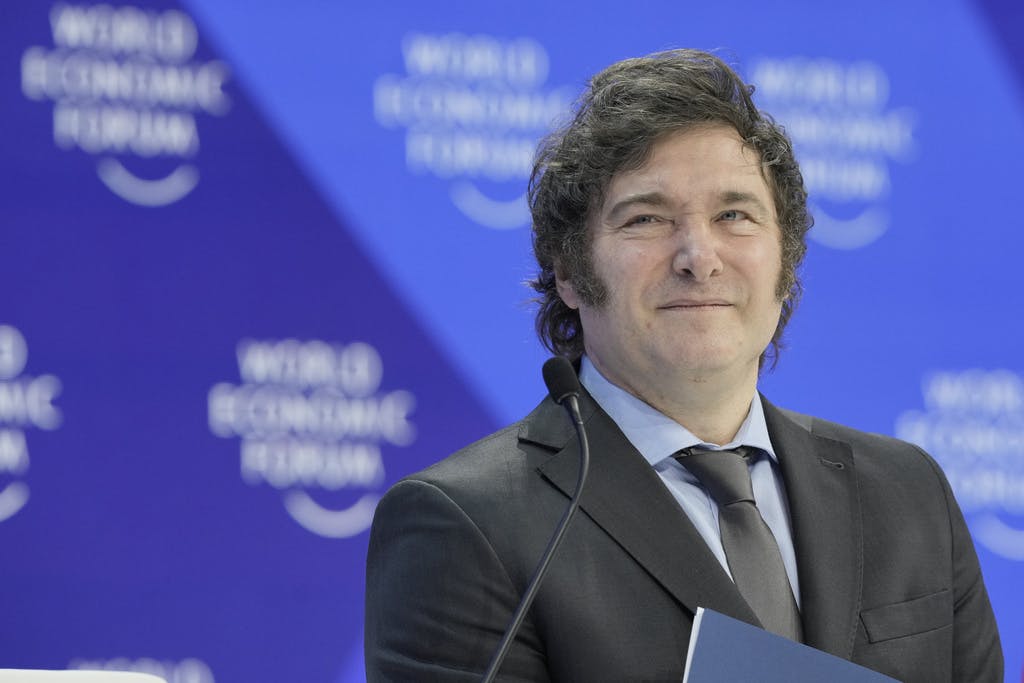Argentina’s Milei Will Make American Debut at Parley in Maryland Amid Battle Over His Program Back Home
Buoyed by visits to Israel and Italy, economist-turned-president searches for a way forward for his program to dismantle Perónist socialism.

The president of Argentina, Javier Milei, will travel to America for the Conservative Political Action Conference next week, according to La Nacion. Before he shows his libertarian bona fides to America, though, he faces a bruising domestic battle for the passage of his legislative agenda and the future of Argentina’s economy.
Mr. Milei is back in Argentina following what he calls “a perfect tour” to Israel and Italy. Upon boarding the return flight from Italy, Mr. Milei was greeted by a plane full of passengers eager to take selfies with the president, according to Argentina’s largest newspaper, Clarín. Some of the passengers sang the song of his campaign trail, “La Renga,” the paper reported.
Now in Argentina, though the flight has ended, it is time for Mr. Milei to really buckle up. The omnibus bill that Mr. Milei’s coalition tried to work through the lower congressional chamber was sent back to committee, putting the bill at square one, according to deputies in Congress.
Mr. Milei had vowed before his presidency that he would put the legislation to a popular referendum if Congress failed to pass it, but recently said the “societal mood” is not ripe for a plebiscite.
“While a referendum is unlikely, it puts pressure on the opposition,” a law professor at the University of Buenos Aires and principal investigator of a major Argentine think tank called Cippec, Martin Bohmer, tells The New York Sun.
In order for Milei to revive his economic agenda, Mr. Bohmer tells the Sun, “he will need to wait until March 1 when Congress resumes normal sessions.” All the sessions that already occurred this month were “extraordinary sessions.”
Until then, Mr. Bohmer says, “Milei is trying to cut a deal” with a former president, Mauricio Macri, “to create a group to support his economic legislation.” Mr. Macri led Argentina between 2015 and 2019 and continues to serve as the leader of the Republican Proposal party known as PRO.
Mr. Milei’s success will depend on him being “less confrontational, talking to other people, and bringing in more politically experienced players,” according to Mr. Bohmer.
An Argentine professor of English language, Marcia Trucco, points out that President Milei’s security minister, Patricia Bullrich, is a member of PRO. Ms. Trucco tells the Sun via video call, “this shows Milei is open to creating space to count on people from other parties.”
Ms. Trucco says, “the opposition wants socialism back.” The opposition is “the heir of Peronism,” referring to the policies of Juan Perón, who served as president between 1946 and 1955 with another brief stint from 1973 to 1974.
“Every time a party like Milei, such as Macri, has come to power,” Ms. Trucco adds, “they lack enough time to reverse socialist policies.” Mr. Bohmer notes that the rise of Milei is a “backlash to progressivism or ‘wokeism,’” but says “he has desecrated the sacred stuff of Argentina — human rights, democracy.”
On the topic of democracy, Ms. Trucco recalls the years of Néstor Kirchner. During his presidency between 2003 and 2007, Mr. Kirchner used 270 decrees of necessity and urgency, akin to executive orders, to bypass Congress. “Milei could use these decrees, but he has not done so because he believes in democracy,” says Ms. Trucco.
In respect of the economy, Milei has portrayed himself as “an extreme pro-market guy who wants the state to be small,” says Mr. Bohmer. With an entrenched legacy of socialism and provincial governors fighting to maintain tax revenues, fulfilling that vision will be no easy task.
Ms. Trucco describes how once students get their degrees, they go overseas. Young people tell her, “we don’t want to say goodbye to any more friends.” She notes that Milei has a unique style, “but having a different style can create different results.”
Regardless of how the domestic fray unfolds, Argentina’s relationship with America has the potential to improve. Mr. Bohmer says, “Milei has an opportunity to improve relations with America as he will not be close to Iran, Venezuela, or Bolivia,” so he can “draw closer with the West.”
An adjunct fellow at the Hudson Institute focused on Latin America, Daniel Batlle, tells the Sun likewise, “the Biden administration should be looking toward Argentina.” Mr. Batlle, who held senior roles in the second Bush administration, continued, “when you have a clearly pro-American leader like Milei, we should be looking at all opportunities to work with them.”
When asked about Mr. Milei’s potential appearance at CPAC next week and recent visit to Israel, Mr. Batlle says, “it is a positive signal going to Israel, coming to America,” and a “strong message who your allies are.”
Mr. Batlle, however, provides a warning, “given his challenges at home, Milei should be cautious about how much energy he invests overseas.” Time and energy constraints will require Mr. Milei to strike a balance between political maneuvering to reform his own economy and devoting attention to strengthening relations with potential international partners.
Argentines, according to Ms. Trucco, “feel like the bottom of the world, the last country the world looks at in South America.” A closer relationship with America could change that. Ms. Trucco says regarding the mood of Argentina itself, “there is hope. Beneath all the uncomfortable realities like inflated supermarket prices, there is hope that we could emerge from socialism.”
CPAC did not immediately respond to a request for comment.

